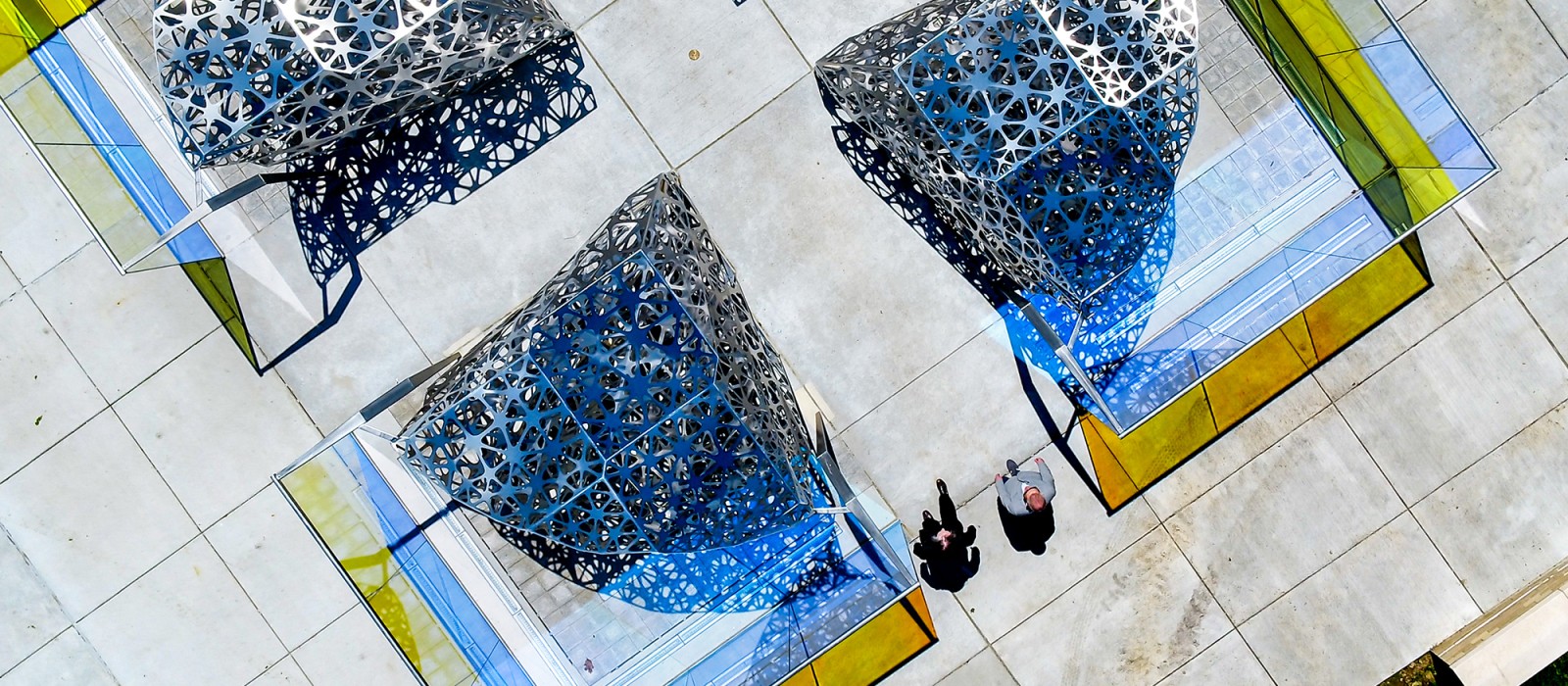
The campaign priorities support the initiatives outlined in CHE’s strategic Vision 2030, which positions the College for growth and will serve as a compass to meet the strenuous challenges of the 21st century and beyond. Photo: Ryan Young/Cornell University
This past fall, Cornell launched a major fundraising campaign that will advance the institution’s goal to become the model of a great research university for the next 150 years. The name for the five-year, $5-billion campaign, “To Do the Greatest Good,” came from a hand-written note Ezra Cornell penned when explaining his driving purpose for founding the University in 1865. The theme is a nod to the University’s history and one that has always been at the core of our mission in the College of Human Ecology.
“We are excited about the campaign and how our mission in Human Ecology resonates with Cornell’s goal ‘To Do the Greatest Good,’” said Rachel Dunifon, Rebecca Q. and James C. Morgan Dean. “Today, on campus and beyond, our students, faculty, staff, and alumni are affecting positive change on so many levels. This campaign will ensure that Human Ecology’s impact on the world is more powerful and far-reaching than ever.”
The College has identified three distinct impact areas, setting an ambitious agenda for how it will fulfill its mission to improve human health and wellbeing. Investing in these areas will further elevate the College’s strategic capabilities and define its competitive position:
- expanding student affordability for highly qualified students who might not otherwise be able to enroll at Cornell
- enabling continuous discovery through strategic and timely investments in faculty, learning spaces and course development
- powering community engagement by forming partnerships to share and apply research in communities around the world
These campaign priorities all support the initiatives outlined in CHE’s strategic Vision 2030, which positions the College for growth and will serve as a compass to meet the strenuous challenges of the 21st century and beyond.
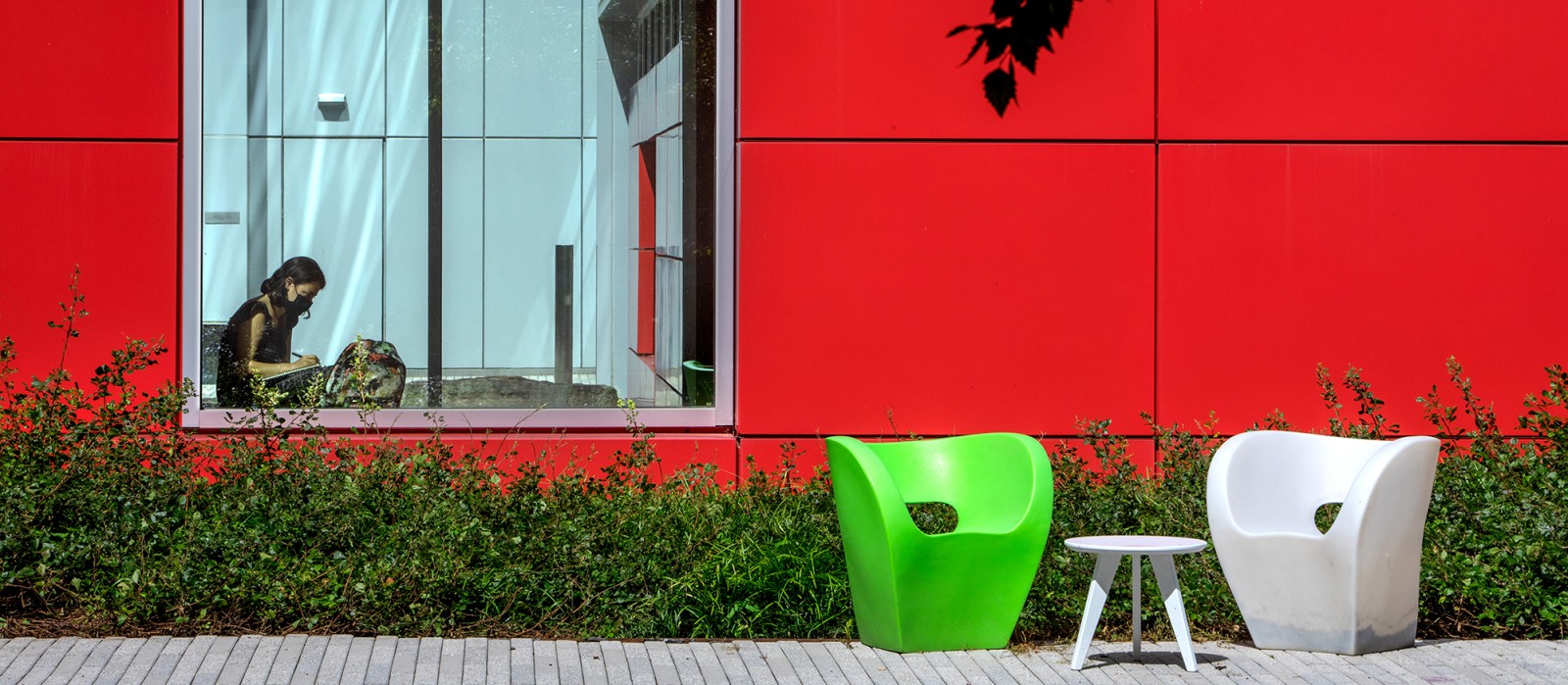
The University has pledged to provide a 1:2 match for donors who establish scholarships of $250,000 or more. Photo: Ryan Young/Cornell University
Expanding Student Affordability
Undergraduate scholarships, Ph.D. fellowships, and experiential learning grants are vital to attracting the best and brightest students whose talent and diversity will have a lasting impact on the breadth and vibrancy of learning at the College. The legacy and impact of this support is profound and spans generations, opening doors for highly qualified students who, absent this funding, would not be able to attend Cornell.
I choose to ‘do the greatest good’ by focusing on ways to better society, especially for minority populations.
Scholarship recipients, like Taeyoung Park ’22, in human biology, health and society, are already making positive change in their communities. Park volunteered at the Ithaca Free Clinic, worked for the on-campus COVID-19 testing team, and earned her emergency medical technician certification. She said these experiences have inspired her to devote her career to medicine and the field of gerontology so that she can continue caring for older adults, caregivers, underserved patients, and others whose needs are often forgotten.
“I choose to ‘do the greatest good’ by focusing on ways to better society, especially for minority populations,” Park said. “My research focuses on caregivers for older adults, who are often overlooked in the health care setting.”
Direct support for learning opportunities outside of the classroom, like summer internships and research, ensures that students can apply their learning in real-world settings, explore career options, and develop their professional network. Olivia Baryluk ’20 credits her internship with the Westchester Institute for Human Development with helping her forge her career path.
To do the greatest good means you wake up every day conscious of all that you have to offer in the world and apply it to be the best version of yourself that you can be.
“Prior to my internship, I had little to no idea what it would look like to be a psychologist, social worker, post-doctorate student or extern,” said Baryluk, who shadowed psychologists working with children. “I was able to see first-hand how trauma affected the lives of children and adults. It sparked my interest to learn more about trauma, and with that, anxiety.”
Baryluk was able to participate in the internship thanks to the generosity of alumna Karen Blumenthal ’72, who provided funding. Thanks to her experience, Baryluk is now a research assistant for the Program for Anxiety and Traumatic Stress Studies at Weill Cornell Medicine.
“It was definitely challenging to find not only an internship in the field of psychology, but also one that was paid,” she said. “Not everyone has the ability to work without some sort of income, and some need a place to stay while completing that internship. If not for Karen Blumenthal’s support, this internship would have been less of an option for me.”
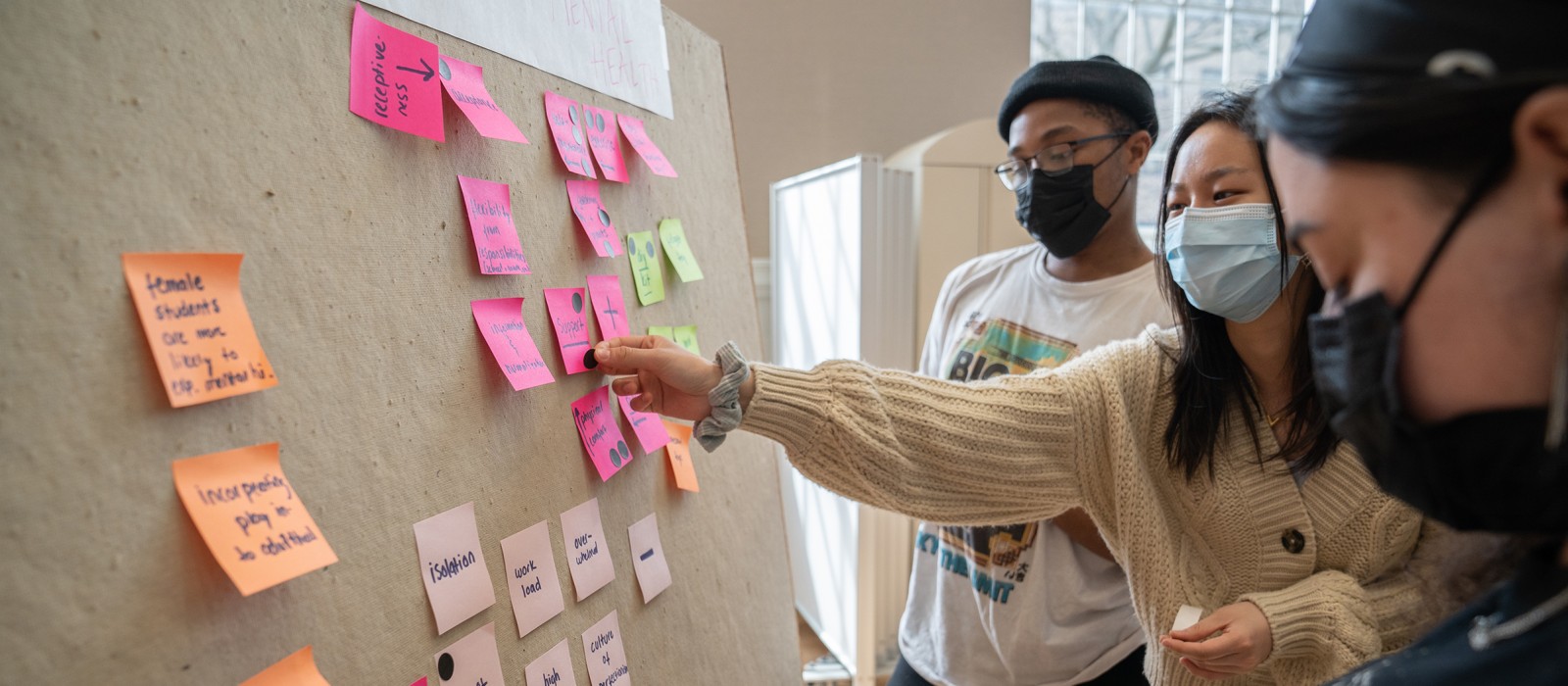
Campaign funds help launch courses like Sustainability in Action, where students are coming up with creative ways to reuse mattress materials and divert them from the waste stream. Photo: Darcy Rose/Provided
Enabling Continuous Discovery
Strategic investments in the College’s faculty, learning environment, and physical spaces will strengthen Human Ecology’s distinct approach to curriculum and research that transcends traditional academic disciplines. In addition to significant recent faculty hiring, named professorships in psychology, nutrition, and human centered design are critical for the College to recruit and retain top scholars whose work informs the future of human health and well-being and career trajectory of Human Ecology students. For instance, last fall the College welcomed eight new faculty members whose work addresses race, ethnicity and the persistence and consequences of inequality under a cohort hiring initiative called Pathways to Social Justice.
“Pathways to Social Justice is an immediate and intentional solution to affect meaningful and purposeful change within the University to increase the diversity of scholarship and impactful, community engagement,” said professor Eve De Rosa, Dean’s Fellow for Racial and Social Justice at the College and Dean of Faculty at Cornell. “Bringing in scholars working on solutions for social justice allows us to allocate resources to build an exciting college-wide intellectual community, to provide opportunities for cross-fertilization, and to facilitate moving scholarship into practice in an innovative, sustainable way.”
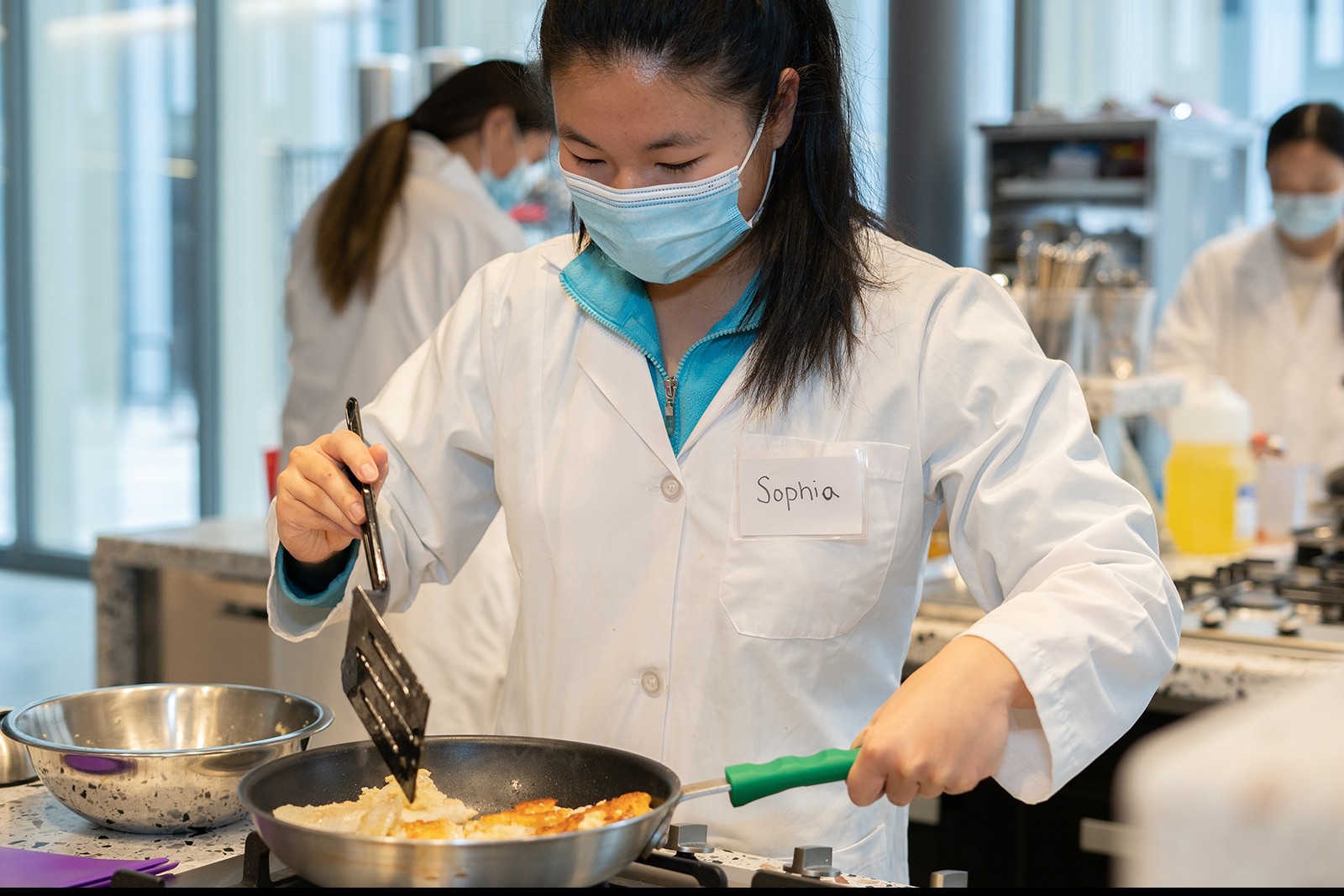
One funding focus is creating cutting-edge facilities like the Discovery Kitchen, where students get hands-on cooking experience paired with nutrition knowledge. Photo: Darcy Rose/Provided
Philanthropic investments to support teaching and learning innovation – including new, cross-college courses on topics like social justice, sustainability, health equity, and technology – will infuse the College’s academic programs with the most relevant and engaging course materials. One of several new courses that exemplify these principles is Sustainability in Action: Radical Reuse, taught by Professor Nancy Wells, senior associate dean for research and graduate education. In this course, students work together in teams to find creative ways to repurpose the components of discarded residence hall mattresses and develop new products to address needs based on human development themes. The project is grounded in materials science and social science literature, and the course features guest speakers from professionals in the reuse and mattress recycling industry.
The vitality of CHE’s academic programs also depends on the quality of the physical spaces where research, teaching and learning occur. The recent renovations of Martha Van Rensselaer (MVR) Hall and the Human Ecology Building provide the opportunity for design enhancements that will inspire creativity and connections.
Newly built spaces, like the Discovery Kitchen, embody the College’s mission by allowing students to learn by doing. Located in the new Toni Morison Hall on North Campus, the state-of-the-art classroom, event space and test kitchen is a significant upgrade from the previous nutrition lab in MVR Hall and help students to explore the role of nutrition in human health and well-being through their research and classes.
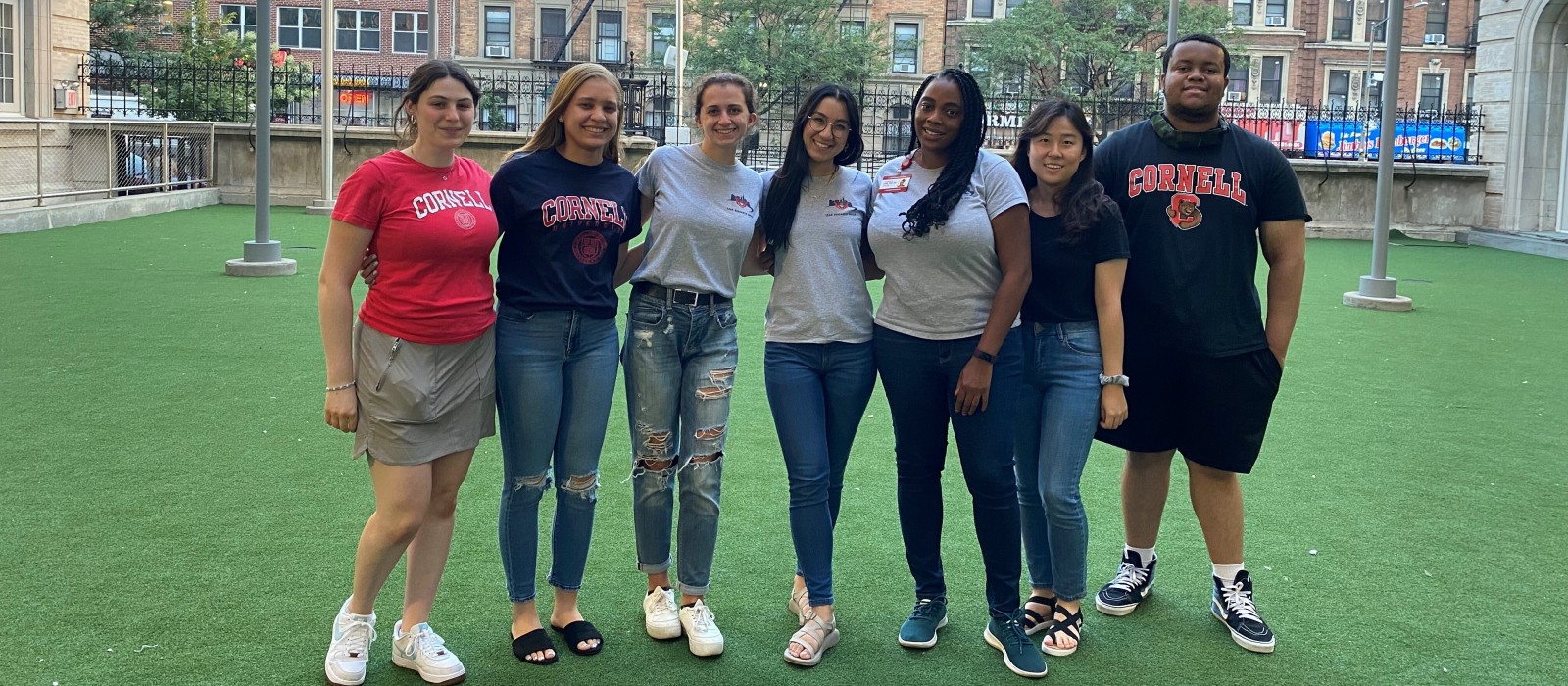
Investments in the Bronfenbrenner Center for Translational Research and a faculty fellowship supported Tashara Leak's work with teens in the Boys & Girls Club of Harlem. Students in Leak's lab collaborated with the teens to develop a nutrition education program. Photo: Provided
Powering Community Engagement
As one of just four contract colleges at Cornell, Human Ecology seeks to expand its land-grant commitment through the campaign by fueling new, boundary-breaking partnerships in New York State and beyond. These partnerships will strengthen the link between science and service and generate practical solutions to complex, real-world problems.
Funding areas include new centers in Integrative Developmental Science and Nutrition for Precision Health. These new academic units will ensure Human Ecology remains at the forefront of topics in human health and well-being by building on existing areas of academic distinction within the College.
When you have community…anything is possible.
A new Action Research Collaborative (ARC) will bring together researchers, practitioners, community members, and policymakers to address pressing issues in society and help foster a unified network of people and programs delivering CHE’s mission in New York City. The ARC is co-led by Tashara Leak, assistant professor in the Division of Nutritional Sciences, and will support research projects like the ones in her lab. Students in Leak’s lab created an innovative nutrition education program for teens in partnership with the Boys and Girls Club of Harlem, which was supported by funding from the David M. Einhorn Center for Community Engagement and alumna Erica Karsch ’94.
“My primary outcomes, of course, are around nutrition and health, but I try to think about people holistically,” Leak said. “By the end of the program, the teens had these friendships, and to me, that’s 10 times more important than the nutrition piece, because we created community. And when you have community…anything is possible.”
We can all do the greatest good
Through the campaign “To Do the Greatest Good,” Human Ecology seeks to raise at least $50 million and engage over 13,000 alumni by 2026 to fulfill the College’s founding promise. To learn more about the campaign, and how you can get involved, contact HEaad@cornell.edu.
Share your story
What does it mean to you to “do the greatest good”? Send us your story at hecommunications@cornell.edu, and it could be included in a future issue of HE Magazine or on the College’s social media accounts.
Back to Human Ecology magazine